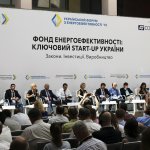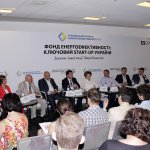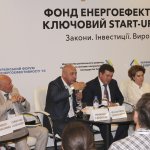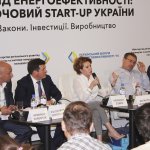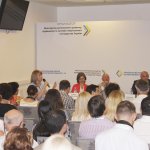The conditions for the beginning of energy-efficient modernization and the more active use of energy-saving technologies have been created in Ukraine. This thesis became a primary conclusion of the panel discussion “Who and how will insulate our houses? Are Ukrainian manufacturers ready for coming investments in the energy-efficient market?”. The discussion was held in the framework of the “Energy Efficiency Fund – UKRAINE’s Major START-UP” Forum organized by the Ministry of Regional Development, Building and Housing and Communal Services of Ukraine together with the А7 CONFERENCES company. The Construction Sector Head of the Better Regulation Delivery Office (BRDO) Olena Shulyak moderated the panel devoted to the housing and public utilities modernization and the potential of Ukrainian construction materials manufacturers.
The “Energy Efficiency Fund – UKRAINE’s Major START-UP” Forum became a platform for the exchange of views and the dialogue in the sphere of the energy-efficiency between the government, business, international partners, experts, the local self-government and the community. The Prime Minister of Ukraine Volodymyr Groysman, the Vice Prime Minister – Minister of Regional Development, Construction and Housing and Communal Services of Ukraine Hennady Zubko, Government Ministers, people’s deputies of Ukraine, the Head of the Support Group for Ukraine at the European Commission Peter Wagner, representatives of local authorities, leaders of the top 100 Ukrainian and international energy efficiency companies, foreign investors, representatives of international financial corporations and foreign embassies were among the forum’s participants.
As Olena Shulyak mentioned at the beginning of the debate in the framework of the panel discussion, the total housing stock consists of nearly one billion square meters, and the average age of Ukrainian houses is almost 42 years. Most of these buildings are needed to be winterized. This scale requires not only the cash, but also opportunities to fill the market with high-quality and preferably domestic construction materials.
The Deputy Minister of Finance of Ukraine Sergiy Marchenko spoke about the real steps which were developed by the state to support manufacturers and citizens of Ukraine for the purpose of effective implementation of energy efficiency programs. The speech of the representative of GIZ (DEUTSCHE GESELLSCHAFT FÜR INTERNATIONALE ZUSAMMENARBEIT) Mrs. Christiana Hageneder became the next one, and she shared with the panelists not only the information on the possible support of Ukrainian reforms in the energy saving area, but also the practical German experience in this question. The Forum participants mentioned the conformity of the starting situation with the housing stock’s state, which has been already modernized in the FRG, and concluded that the German experience would be extremely useful.
The Vice Prime Minister, Minister of Regional Development, Construction and Housing and Communal Services of Ukraine Hennady Zubko stressed that the created Energy Efficiency Fund was a step to the European standards of energy production, supply and consumption in Ukraine. The panelists knew about real achievements directly from the local authorities – Volodymyr Honcharov, the Deputy of Kyiv City Council and Volodymyr Smoliy, the Dolyna deputy mayor.
Also, Volodymyr Smoliy spoke about a particular experience of the city of Dolyna, Ivano-Frankivsk region, which had one of the most significant achievements in the field of energy efficiency in Ukraine in recent years despite the status of a small district center. The speaker noted that the effective energy management had been introduced in the city due to the implementation of the municipal sustainable development strategy in the field of energy consumption 2020. The local authorities could reduce the use of energy resources by at least 10% without any capital investments. When energy-effective measures have been implemented in state buildings (hospitals, schools, kindergartens, etc.), the level of energy consumption was reduced by 20%. For today, local authorities have been already made the thermo-modernization of 30 high-rise buildings (30% of municipal apartment buildings with 20 000 dwellers). It is planned to increase the level of thermo-modernization up to 60% for three years. Smoliy also shared the experience about forming the legal framework on energy efficiency issues and raising funds from various sources to implement municipal programs.
The lively discussion developed into the question-answer series due to reports of domestic manufacturers and distributors of building materials who were represented by owners and directors of enterprises Nataliya Yeremieieva, Oleksandr Radchenko, Yuriy Tikhonov and Oleksiy Bilenko. Volodymyr Honcharov was actively involved in that discussion.
“The discussion was very efficient, only the exchange of views took 2 hours. And in this case I even didn’t expect such an activity from the participants, the hall was full all time, there wasn’t even enough seats for the audience”, Olena Shulyak concluded.
The BRDO expert also noted that the panel discussion became a representative reflection of the state of the energy efficiency in Ukraine.
“We heard government’s views about strategic reforms, ways of funding and state support, received the visions of our foreign partners and consultants. And the main one is making a platform for direct conversation of the state, manufacturers, market regulators and final consumers. As a bonus, I’ll notice the opening of specific successful case studies on the implementation of energy-efficient technologies in Ukraine at the municipal and corporate levels”, – the moderator summed up the discussion.
Following the discussion, the participants outlined a number of directions for further processing. The realization of the national energy-efficient strategy must be an important element of the successful state. All parties from the state to manufacturers and consumers user are interested in it. At the same time, participants noted that there were certain elements of delaying reforms in this sector. Particularly, only at this moment there are more than 30 bills stimulating the energy-efficient consumption and the production of materials in the Verkhovna Rada. Separately, vectors of improving the regulatory policy in this field (from introducing the marking of materials by energy-efficient classes to reducing the state control by transferring some powers to expert organizations) were outlined during the session. Also, according to experts, it is important to carry out the awareness-raising work advocacy work with regions and directly with final consumers concerning the energy-efficient problems.
